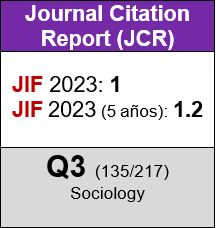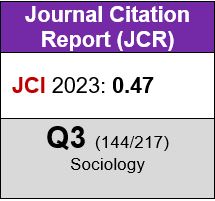La europeización de la política migratoria y la transformación de la otredad
DOI:
https://doi.org/10.5477/cis/reis.116.157Palabras clave:
Política de Inmigración, Inmigrantes, Comunidades Europeas, Ciudadanía, Derecho de Extranjería, Identidad Nacional, Identidad Colectiva, Discriminación Racial, Integración Cultural, Minorías, Grupos Étnicos, Grupos ReligiososResumen
La Unión Europea está experimentando importantes transformaciones tanto a nivel normativo como a nivel identitario. Los "otros" en Europa ya no son sólo aquellos que no poseen la ciudadanía de uno de los Estados miembros de la Unión. En el nuevo contexto migratorio europeo, la otredad.. definida en base al derecho -la extranjería- ha sido complementada con una definición cultural y étnicamente coloreada. El artículo analiza la construcción de categorías y clasificaciones identitarias que subyacen a las nuevas formas de exclusión e inclusión que se pueden encontrar en el contexto de una Europa que emerge como entidad política, legal y cultural. Se focalizará más específicamente en la formación de identidades colectivas particulares que son objeto de estigmatización y derogación como resultado del proceso de "europeización" y de la constitución de una "identidad europea imaginada". En un contexto caracterizado por la insistencia cada vez mayor en la dimensión jurídica de las relaciones sociales y el auge de las identidades afirmativas, este proyecto trata de analizar los procesos de categorización y derogación de los individuos y grupos en base a la "cultura" o "etnicidad" y sus consecuencias para los grupos minoritarios (movilización, sumisión, retirada, etc.) y los grupos mayoritarios (lucha contra la discriminación, imposiciones culturales y normativas, prácticas interculturales, etc.). Se otorga una importancia particular al examen de la hipótesis según la cual la definición de identidades colectivas derogadas -los "ajenos a Europa"- está en transición desde una definición legal (nacionalidad) a criterios culturales/étnicos ("Negros", "Gitanos", etc.) o incluso a una definición religiosa ("Musulmanes")
Descargas
Descargas
Publicado
Cómo citar
Número
Sección
Licencia
Derechos de autor 2024 Revista Española de Investigaciones Sociológicas

Esta obra está bajo una licencia internacional Creative Commons Atribución-CompartirIgual 4.0.
Permite Compartir — copiar y redistribuir el material en cualquier medio o formato, Adaptar — remezclar, transformar y construir a partir del material para cualquier propósito, incluso comercialmente.








